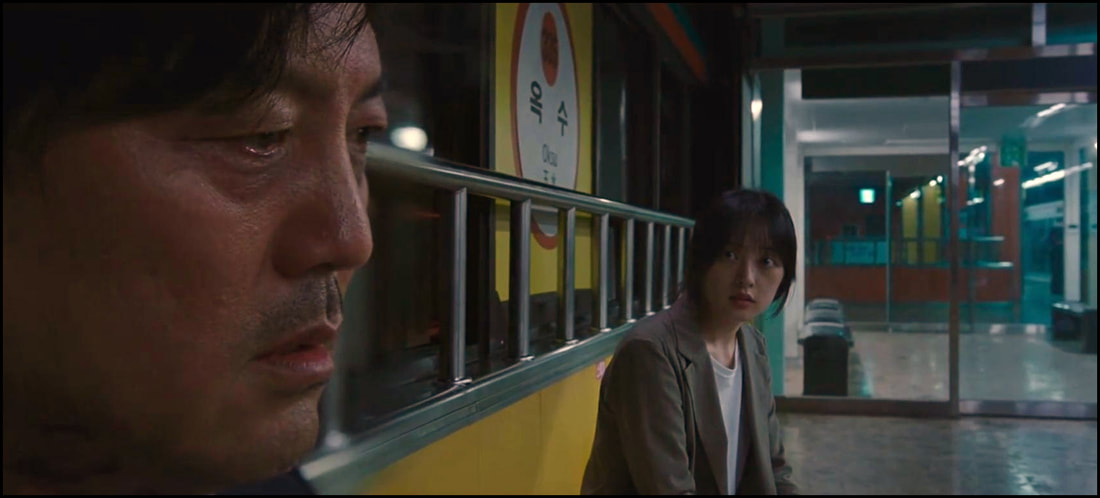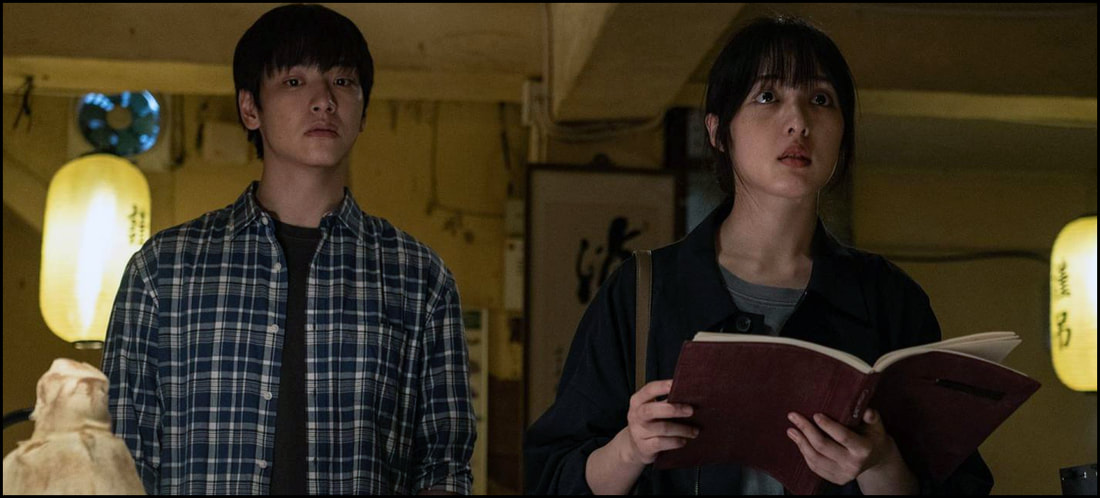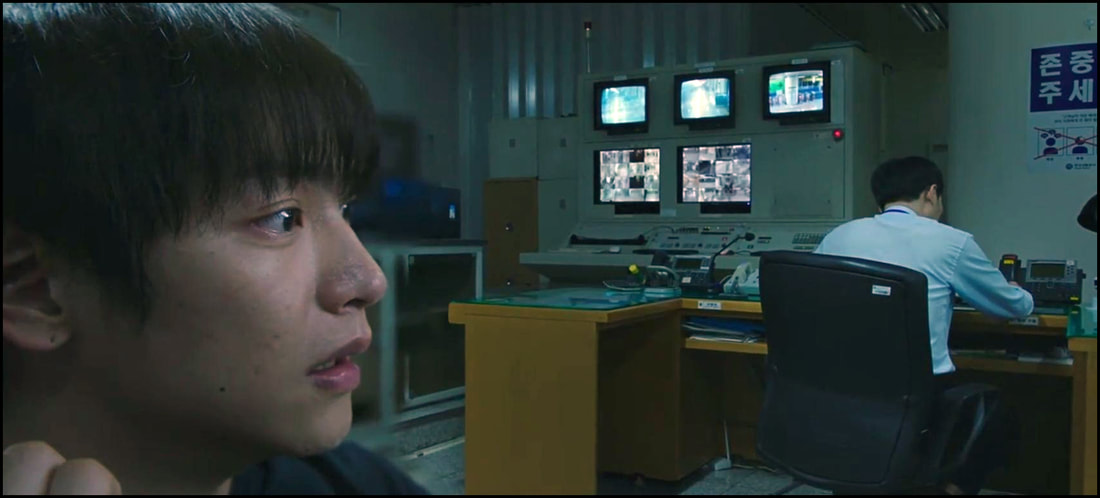The biggest reason for this fall-off of interest on my part is owed to the fact that, globally, many storytellers have really gone all-in with All Things Zombie; and that phenomenon – while often quite interesting – just has fallen into a creative rut, so far as I can see. For all intents and purposes, there has always been only two types of undead walkers – the slow, lumbering, stumbling variety or the super-fast, crazed, rabid dog-like variants – so unless the central story truly pushes the envelope in a direction I’ve not seen, an entire library of entries feels repetitive. Until such a time that there’s a renewed fascinations with spirits and ghosts, I’m inclined to just ride things out … only then a little something something like The Ghost Station (2022) comes along and challenges me to rethink my self-imposed time-out.
As I’ve come to understand, Station is a screen adaptation of a popular Korean webtoon: Oksu Station Ghost (aka The Ghost Of Oksu Station, depending upon the translation) was written and illustrated by Horang, and it explores the paranormal happenings involving some vengeful ghosts seeking their own form of vengeance from the other side while being tied to a Korean subway station. As best as I can tell, the story originally came to life in 2009 (some outlets suggest it was later in 2012, but I’m going with what I’ve found until I can substantiate it further); and its popularity alone practically dictated that it would eventually find life on the silver screen. After all, who doesn’t care for a good ghost story every now and then?
On the front end of my review, I’m perfectly comfortable saying that I enjoyed the stop at this Station, but a bit of extra reflection might be required to dissect what was a bit inferior. These days, nothing is perfect, but kudos to all involved for trying something a bit outside the box for what audiences appear to desire most.
(NOTE: The following review will contain minor spoilers necessary solely for the discussion of plot and/or characters. If you’re the type of reader who prefers a review entirely spoiler-free, then I’d encourage you to skip down to the last few paragraphs for the final assessment. If, however, you’re accepting of a few modest hints at ‘things to come,’ then read on …)
From the film’s IMDB.com page citation:
“A public service worker at Oksu Station witnesses a shocking incident and recruits his friend to help uncover the truth behind the station’s mysterious happenings.”
While I’m not inclined to get into a plethora of examples categorizing these distinctions, I’m willing to mention a few. American ghosts tend to get involved in shenanigans to the point wherein they can instill some serious bodily harm on the victims; 1982’s The Entity – starring the lovely Barbara Hershey – explored the grim details of Carla Moran, a woman repeatedly raped at the hands of a rather lecherous ethereal aggressor. Still, the operative word here is ‘shenanigans;’ Western ghost are usually involved far more in spectral pranks – moving chairs, opening doors, knocking on windows, etc. – and these spirits are typically downplayed to the point wherein most folks are perfectly comfortable sleeping in a haunted house. In fact, do a Google.com search, and you’ll find a good number of them as tourist destinations if not AirBNBs … for your otherworldly enjoyment.
By comparison, Eastern Horror – especially as depicted on film or television – doesn’t quite revel in the bloody excesses that we in the U.S. appreciate so much. Perhaps it’s safe to suggest that such frights are intended to be more imaginative, pushing what truly goes bump in the night into the fertile brains of those witnesses such delights in lights and shadows. I’ve read on many occasions that connoisseurs insist that Japanese and/or Korean releases rely more heavily on establishing an atmosphere of dread; this might require delivering stories that are a bit more involved personally with characters, their friends and family, and/or their descendants, pushing instead for a bit of subtlety in places wherein Westerners want the heart-pounding images punctuated with stylish visuals, ample special effects, and an inspired soundtrack. Suffice it to say that what scares us may not exactly be what scares them, and that’s why American studios would prefer to remake a popular J-Horror project instead of giving it theatrical runs here in the states.
So … Station does have some ingredients that make it uniquely Eastern. Its central story involves the dark fate of a forgotten orphanage – along with the children its caretakers were entrusted to serve – and the resulting curse that can only come to life, initially, with those closest to the covered-up events. But just as watching a video featuring a murdered girl can pass along the curse to viewers seven days later (in 1998’s Ringu), Station dabbles in the same black witchcraft while also dishing out a bit of social commentary on the nature of press and/or state relations at the same time.
Flash reporter Kim Na-young (underplayed by a somewhat dowdy Bo-ra Kim) finds her and her reportage in hot water when she inadvertently outs a Trans in print, an action that brings the he/she to filing for a financial settlement against the newspaper. In order to keep her job, Kim is forced to find something that’ll ‘get clicks’ and fast, and – thankfully – her best buds Woo-won (Jae Hyun Kim) and Seung-joon (Oh Jin-Seok) have a scoop-in-waiting: their jobs at the Oksu Train Station has given the direct access to footage featuring a passenger committing suicide on the rails beneath a screaming subway … and there just might be more to it. Once the conductor who drove the train turns up dead under curious circumstances, Kim realizes that’s far more to the story than just unfortunate coincidence … and it just might involve ghostly children, a forgotten orphanage, and a curse that stretches from beyond the grave.
Still, there’s a subplot involving Kim’s publisher (the attractive but domineering Kim Na-Yoon) that kinda/sorta disturbs the flow of the second half. This isn’t to suggest that there’s no measure of delight in seeing the comeuppance a snooty boss necessarily deserves; rather it’s pretty easy to see that 11th hour plot twist coming – even despite a little misdirection – and this has Station ultimately fading to black without a full resolution to what put everything in motion in the first place. Whether that was intended as a possible cash grab should the first film prove profitable is presently unknown … but I’ll keep my eyes peeled in case producers want to jump on the franchise bandwagon.
The Ghost Station (2022) was produced by Studio & New. DVD distribution (for this particular release) is being coordinated by the fine folks at Well Go USA Entertainment. As for the technical specifications? While I’m no trained video expert, I thought that the sights-and-sounds to this Horror/Fantasy were, actually, quite impressive. Director Yong-ki Jeong utilizes a great many scenes composed with some deep focus cinematography, and I think the entire milieu feels part-and-parcel to just about any ghost story I’ve run across in the past few years. Lastly, if you’re looking for special features? As I viewed this one via a streaming link, there were no special features to consider.
Recommended.
Frankly, there are elements to The Ghost Station (2022) that may not be all that original or refreshing. At times, this Korean Horror project feels more like writer/director Yong-ki Jeong – along with fellow scribes Horang, Soyoung Lee, Koji Shiraishi, and Hiroshi Takahashi – was intending little more to pick up some traits of popular frights of the past in order to riff on them for modern audiences. That isn’t a bad thing because it does feel like the intention here was as much to pay homage to what’s come before while also delivering something that kinda/sorta fits within the same supernatural or spectral universe. Besides, if you had a grudge to play, why not shamelessly steal from some of the best?
In the interests of fairness, I’m pleased to disclose that the fine folks at Well Go USA provided me with complimentary streaming access to The Ghost Station (2022) by request for the expressed purpose of completing this review. Their contribution to me in no way, shape, or form influenced my opinion of it.
-- EZ




 RSS Feed
RSS Feed